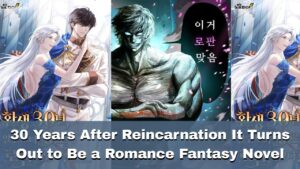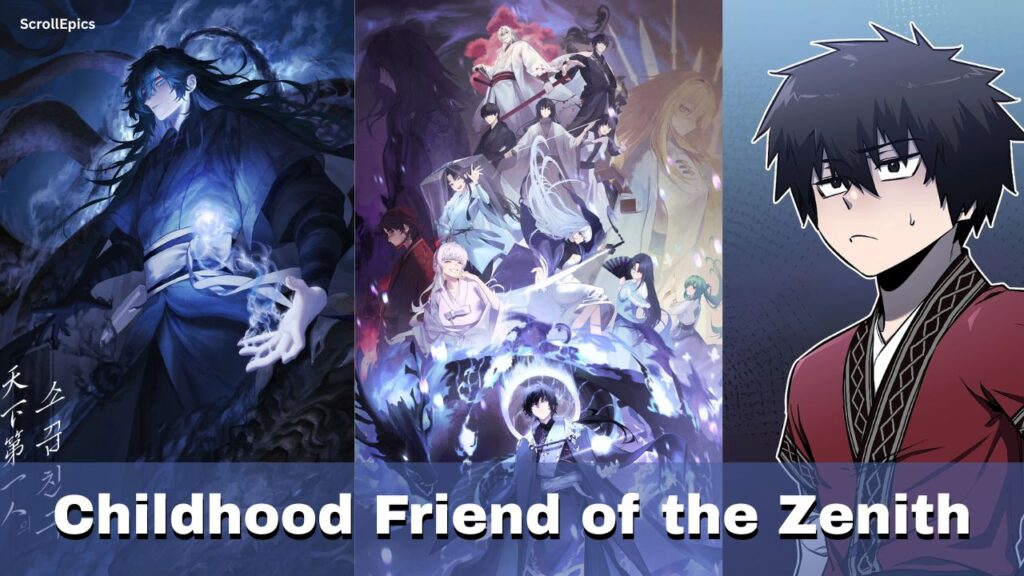
At first glance, 30 Years After Reincarnation, It Turns Out to Be a Romance Fantasy Novel sounds like another soft isekai or an emotionally charged drama built on love, regret, and second chances. It isn’t.
What you get instead is a genre-breaking fusion—one that throws every trope in the Korean web novel playbook into the blender and somehow makes it work. Murim? Check. Transmigrators? Yes. Regression? Of course. Status windows, eunuch plots, academies, Wuxia-inspired martial arts, a Western fantasy setting—all of it’s here, stitched together by a main character who fights like a monster and lives like he’s on borrowed time.
The romance? Surprisingly grounded. The fantasy? Huge in scope. But what makes this novel stand out isn’t its genre—it’s the fact that it treats every cliché like a piece of narrative metal to forge into something entirely new.
It’s not perfect—some characters feel flat, the names get confusing, and the translation can be rough at times. But 30 Years After Reincarnation succeeds where most mashup novels fail: it feels intentional. It feels whole.
Where to Read 30 Years After Reincarnation, It Turns Out to Be a Romance Fantasy Novel
You can find this genre-blending Korean web novel on several fan-translation and aggregation platforms:
- Novel Updates: lists it under the title 30 Years After Reincarnation, It Turns Out to Be a Romance Fantasy Novel, noting it’s published by Novelpia, currently ongoing (around 122 chapters), with an English fan-translation available via external sites.
What 30 Years After Reincarnation It Turns Out to Be a Romance Fantasy Novel Is Really About
At its heart, this novel isn’t about romance. It’s not even really about fantasy in the traditional sense. It’s about identity, genre subversion, and what happens when a martial artist wakes up in a world that keeps pretending it’s something else.
The protagonist is a man who lived, fought, and died in a world that followed murim laws. When he’s reincarnated into a world that looks like a typical romance-fantasy setting—complete with academies, noble houses, status windows, and transmigrators—he doesn’t adjust. He reshapes it.
He’s not a chosen one. He’s not a genius. He has no secret bloodline. What he does have is an obsession with martial arts from his previous life, a body tortured through repetition, and the sheer will to impose his worldview on a world that was never built for it. And as the story progresses, that contradiction becomes the novel’s driving force.
Yes, there’s a regressor. Yes, there’s a system user. Yes, there’s even a transmigrated Korean woman from a romance fantasy game. But while all those tropes exist around him, the main character doesn’t play their game. He plays his own.
The “romance” part of the title is almost ironic—there is romance, but it’s messy, awkward, and completely devoid of the usual fluff. The “fantasy” is chaotic and genre-bending. The “30 years later” isn’t just a time skip; it’s a worldview forged in blood trying to navigate a world of flowers and noble etiquette.
And somehow, it all works.
Tone, Style, and Core Themes
This isn’t a typical reincarnation story. The tone of 30 Years After Reincarnation walks a fine line between chaotic comedy and unrelenting martial determination. At times, it’s genuinely hilarious—filled with absurd misunderstandings, trope reversals, and meta-aware jabs at genre clichés. At other times, it hits hard with grit, passion, and pain you don’t usually see in a “romance fantasy.”
What makes the tone so unique is how the novel refuses to settle. Just when you think it’s going full academy slice-of-life, it brings out a brutal fight sequence. Just when you expect a romantic scene, it veers into political intrigue—or a sudden clash of ideals and fists. The story has the pacing of a Wuxia epic, but wrapped in the costume of a Rofan (romance fantasy) setup. And it never lets you forget that contradiction.
Martial Arts as Salvation
The MC doesn’t just practice martial arts—he lives by it. He builds a path in a world that doesn’t recognize his values, creating a philosophy rooted in effort, discipline, and survival. His martial path becomes not just strength, but identity and purpose. His every breakthrough isn’t just a power-up—it’s a spiritual statement.
Genre Mash-Up Done Right
This novel throws everything at you: murim, system-users, reincarnators, transmigrators, nobles, western kingdoms, eastern martial codes, even eunuchs. But it doesn’t fall apart. Each trope is introduced with care, used intentionally, and layered into the bigger world. It’s not satire—it’s synthesis.
Misfit Among Tropes
The MC doesn’t belong. Not in the romance genre, not in the game system world, not in the imperial court. But instead of adapting, he changes the world around him. His journey is not about fitting in—it’s about surviving as himself. And that becomes the emotional spine of the novel.
Comedy Through Contrast
The humor works because the MC is so different from everyone else. He reacts to delicate political situations with direct punches. He hears flowery flattery and responds with raw truth. It’s not gag humor—it’s tonal dissonance used effectively. And it’s funny because it feels real.
30 Years After Reincarnation, It Turns Out to Be a Romance Fantasy Novel Characters Guide
Main Character: The Reincarnated Martial Artist
A war-weary martial hero reincarnates into a new world 30 years later, retaining complete memories of his past Korean life and his mastery of Murim-style martial arts. Prior to the reincarnation, he served as a knight, soldier, and warrior—ultimately retiring only to be forced back into action, playing a double role in politics and war . Despite a setting full of system users, status windows, and transmigrators, he remains focused on martial excellence—driven by discipline, perseverance, and self-reliance.
Transmigrator Game Developer (Female)
A female game developer from Korea reborn into the novel’s world, complete with a status window interface—another genre staple . Her presence adds meta-commentary and occasional comedic relief as she navigates her “game-like” surroundings while the MC approaches things differently.
Regressed Academician
Another key character is a regressor who grew up within the academy system and rewinds time by 15 years. Tasked by a future empress—who has a child—to ensure the safety of her lineage and retain political stability. His story runs parallel to the MC’s and intersects most clearly during academy and court politics.
Future Empress & Her Royal Son
A mysterious future empress plays a behind-the-scenes role: she manipulates events to secure her son’s path and protect future rulership. While not always center stage, her decisions shape the political tensions that pull the MC into key alliances.
Supporting Cast & Euphemistic Archetypes
Minor nobles, knights, eunuchs, academy officials, transmigrators, and martial artists fill the world—many following standard archetypes (e.g., corrupt noble, earnest knight, sly eunuch). They largely serve to reflect or contrast with the MC’s intense martial identity—but few have more than surface development.
Final Verdict – Is 30 Years After Reincarnation Worth Reading?
Absolutely—but only if you know what you’re walking into.
30 Years After Reincarnation, It Turns Out to Be a Romance Fantasy Novel is one of those rare web novels that sounds like a joke… until it earns your respect. What starts off looking like a cliché-packed, trope-stuffed mess somehow turns into a surprisingly cohesive, character-driven experience. It’s bold. It’s messy. And it works way better than it has any right to.
The protagonist alone makes it worth reading. He’s not your typical overpowered regressor or charismatic noble. He’s a martial artist who clawed his way to strength with nothing but grit, and now he’s been dropped into a world where everything runs on rules he doesn’t care about. Watching him tear through those systems and make the world bend to his pace is one of the most satisfying parts of the story.
But don’t expect perfection. The translation can get clunky. The cast outside of the MC and a few others can feel flat or archetypal. And the naming conventions are a headache until you get used to them. If you’re expecting a traditional romance fantasy, you’ll probably be confused or even disappointed—it only plays with those elements, it doesn’t live in them.
That said, if you’re tired of copy-paste academy or murim plots and want something that dares to mix everything—from Rofan to system-users to pure martial grit—this is a breath of fresh air. It doesn’t always go deep, but it commits to its chaos. And the result is entertaining, strange, and surprisingly impactful.
It’s not for everyone. But if it clicks with you, you won’t forget it.
FAQ – 30 Years After Reincarnation, It Turns Out to Be a Romance Fantasy Novel
What is this novel really about?
It’s about a martial artist reincarnated into a romance fantasy setting—only he doesn’t follow the script. Instead of systems or status windows, he builds a martial path from scratch in a world full of transmigrators, regressors, nobles, and political schemers.
Is it actually a romance?
Not in the traditional sense. While romance exists, it’s handled in the background. The story’s core isn’t about love—it’s about identity, transformation, and resisting a world full of genre tropes.
Is the novel finished?
As of now, it is ongoing with over 120 chapters, and still being serialized on Novelpia. Fan translations are available online.
Where can I read it?
There’s no official English release yet, but it’s available through:
-
NovelBin, Ranobes, Faqwiki.us, and Genesis Studio (fan translation)
-
Listed on Novel Updates with links to various readers
What genres does this novel include?
It combines murim, regressor, transmigrator, status window, academy, imperial court politics, martial arts, and dark fantasy tropes—all in one narrative.
Is the MC overpowered?
Not in the usual sense. He starts with no talent and builds himself through brutal effort. His growth feels earned. He eventually becomes extremely powerful, but it’s all grounded in discipline and hardship.
Does the comedy land?
Yes—and surprisingly well. Most of the humor comes from the MC’s bluntness, genre misunderstandings, and reactions to a world full of tropes he has no patience for.
What are the biggest drawbacks?
-
Bland side characters
-
Too many similar names
-
Occasional confusing translation
-
Some arcs may feel disjointed if you’re expecting clean genre lines

